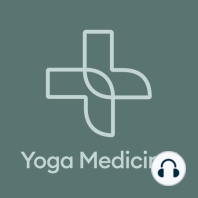56 min listen

21 South Asian Teacher Panel with Rashmi Bismark MD MPH, Ashish Arora, Monisha Bhanote MD FCAP ABOIM and Pooja Virani
FromYoga Medicine
21 South Asian Teacher Panel with Rashmi Bismark MD MPH, Ashish Arora, Monisha Bhanote MD FCAP ABOIM and Pooja Virani
FromYoga Medicine
ratings:
Length:
78 minutes
Released:
Mar 17, 2022
Format:
Podcast episode
Description
In today’s episode, we bring together four yoga teachers with personal or family roots in different parts of India to talk about their experiences with yoga, while growing up and now. They offer their unique perspectives on practicing and teaching yoga in the modern context. Previous podcast guest Rashmi Bismark facilitates the conversation. Rashmi is a U.S.-trained physician, board-certified in both preventative medicine and public health, who blends eastern and western traditions in her medical practice. Ashish Arora was born in Delhi and moved to the U.S. 21 years ago. After a career as an engineer in the computer and video game industry, Ashish now teaches yoga full-time. Monisha Bhanote was born in Punjab and emigrated to the UK, then the U.S., with her family. A quintuple board-certified physician with more than 20 years of experience in health care, she is the founder of the Holistic Wellbeing Collective. Pooja Virani grew up in New York City and relates memorable childhood experiences of attending the Iyengar Institute in Pune with her mother and grandmother. Now based outside of Washington D.C., Pooja is a pain-free movement specialist and social justice consultant, specializing in rehabilitative yoga, LGBTQ+ and BIPOC yoga, and social justice education. Listen in to learn how our guests define what yoga is (and is not), discuss cultural appropriation versus cultural appreciation, and share their thoughts on how we can all practice yoga with more reverence and respect. Show Notes: Earliest experiences of yoga, and the central position of philosophy and ceremony [10:26] What is yoga? Eastern vs Western practices [24:00] Common questions: use of the word namaste, and the Sanskrit language [28:11] Perspectives on cultural appropriation in yoga [32:48] Use of the word yogi [39:21] The experience of Indian students in international yoga studios [41:05] Playing music in yoga asana classes [43:45] Statues of deities in yoga studios [47:31] Contrasts between westernized yoga mantra and traditional Indian raga [49:34] The relationship between yoga, religion, and spirituality [58:10] Treating yoga texts with respect [1:07:05] Ways to practice and teach yoga with more mindfulness and respect [1:09:03] Where to from here? More resources [1:16:47] Links Mentioned: Watch this episode on YouTube Yoga Medicine Podcast Episode 06: The Power of Mindfulness with Dr. Rashmi Bismark MD MP Let’s Talk Yoga Podcast ABCD Yogi Community Tejal Yoga Learn more about Mantra and/or classical Indian music: Mantra chanting classes: Sandhiya Ramaswamy Melissa Shah Chanting and Sanskrit texts: Shantala Sriramaiah Kavitha Chinnaiyan Indian classical music: Sheela Bringi Connect with Rashmi Bismark: Instagram | Twitter | Yoga Medicine Online Connect with Ashish Arora: Instagram | Ashish Yoga Connect with Monisha Bhanote: Instagram | Dr. Bhanote Connect with Pooja Virani: Instagram | Pooja Virani You can learn more about this episode, and see the full show notes at www.YogaMedicine.com/podcast-21. And you can find out more about insider tips, online classes or information on our teacher trainings at www.YogaMedicine.com. To support our work, please leave us a 5 star review with your feedback on iTunes/Apple Podcasts.
Released:
Mar 17, 2022
Format:
Podcast episode
Titles in the series (100)
06 The Power of Mindfulness with Dr. Rashmi Bismark MD MPH: Today Rachel talks about the power of mindfulness with Dr. Rashmi Bismark MD MPH, a U.S.-trained physician who is board certified in both preventative medicine and public health. Dr. Rashmi is uniquely qualified to speak on the impact of mindfulness... by Yoga Medicine